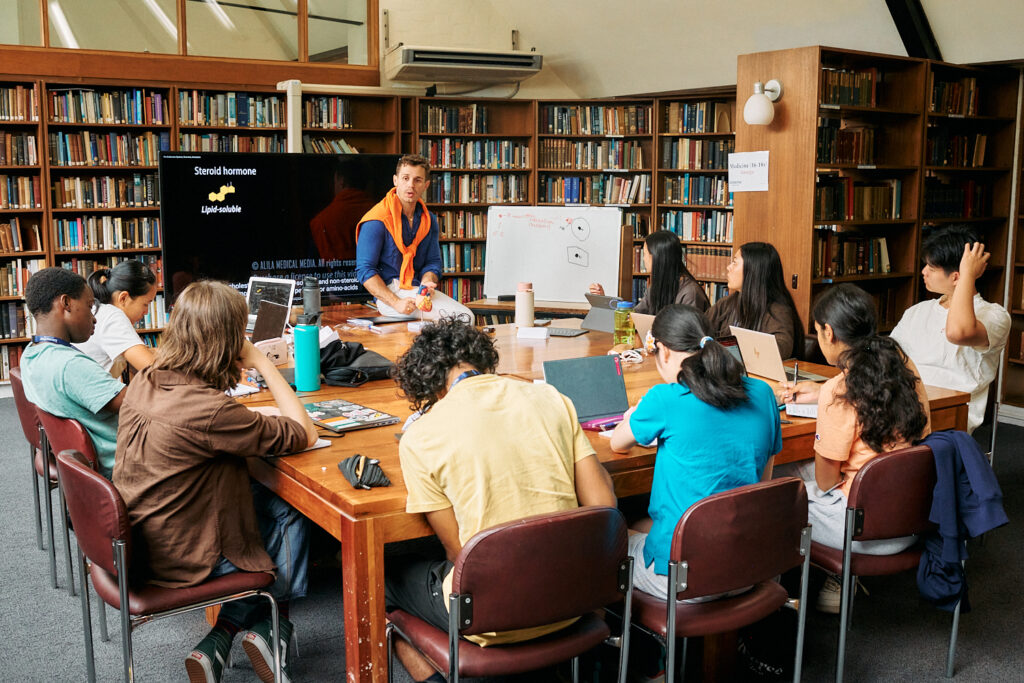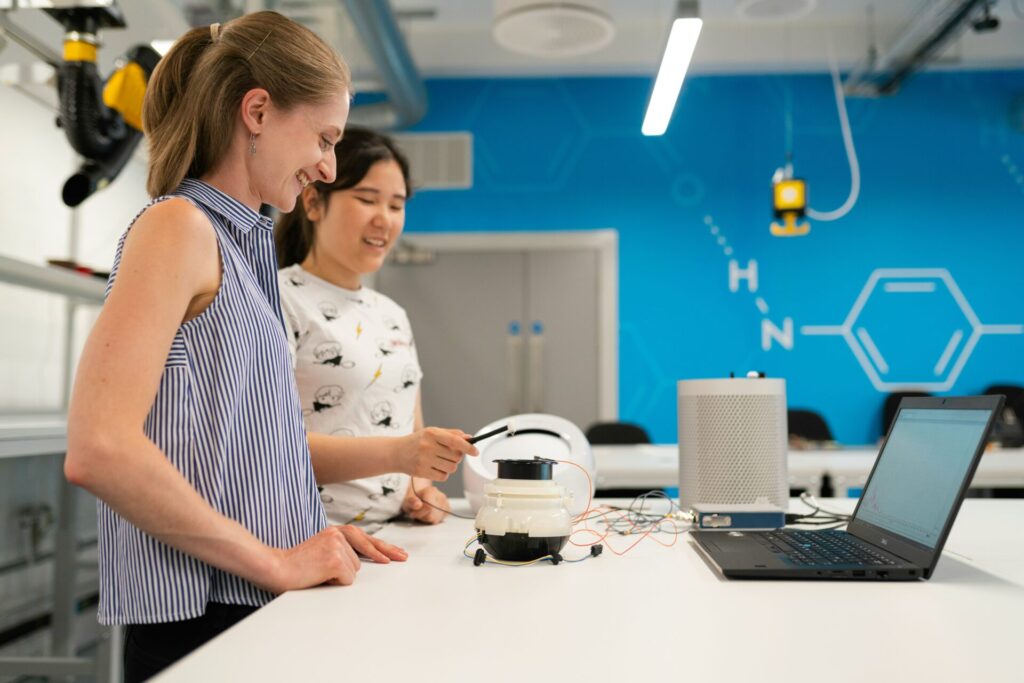As you approach your university years, you’ll discover that standing out from the crowd takes a lot of hard work, time and dedication. One way to achieve this is to publish research papers. These academic documents present the results of in-depth research into a specific topic and demonstrate your ability to analyse, interpret, argue and write a clear thesis.
At the same time, dedicating time to research papers is a great way to disseminate knowledge, foster intellectual discourse and contribute to the advancement of a particular field of study. All of this plays a key role in your career progression, which can enhance your professional reputation and lead to potential job opportunities, promotions and collaborations.
At Immerse Education, we are here to help you hone the skills you need to succeed in your higher education. Later in this article, we will explain how to publish a research paper and how our Online Research Programme can help you, as a 13-18-year-old student, to develop your research and writing skills.
Step-By-Step Guide to Publishing a Research Paper
When it comes to publishing research papers, you need to work within a set structure to help you present your findings and thesis in the most professional way. Competition can be fierce, so you want to avoid presenting poor or incomplete papers.
With this in mind, this article provides a complete step-by-step guide on how to write a research paper. Keep in mind that there is no one-size-fits-all approach to this, but we want to make the process as easy as possible for you to succeed.
Step 1: Choosing a Journal to Approach
The first step in this process is to decide where you want to publish your research. This process can seem daunting, but it does not have to be. Asking yourself the right questions will help you narrow down your options until you find the best academic journal to submit your work to when it’s ready.
Remember that choosing the journal first will help you to tailor your work to the format and style of the journal. It will also serve as a guide in determining the specifics of your work, including the approach to the topic, as that journal may have already published work on the topic and you can build on that.
To narrow down your options, we recommend that you start by making a list of potential academic journals. Talk to students, professors, librarians and professionals in the field. You can then start to narrow down the options by considering factors such as:
- The aims and scope of the journal
- The subject of your research
- The reputation of the journal
- The reputation of the editors in the community
- The journal’s editorial/review and production speed
- The target audience of the journal
- Coverage and distribution
- Accessibility (open access vs. closed access)
- The type of manuscript you are writing
- The importance of your work
Step 2: Writing a Paper
Once you understand the aim, scope and publication guidelines of the journal of your choice, you need to sit down and start writing. To be successful in this step, it’s vital that you follow these suggestions:
- Always know who you are writing for; this will help you to ensure that the style, tone and structure are aimed at the end reader.
- Read the guidelines provided by your target academic journal. You want to meet their requirements from the outset and avoid having to make unnecessary changes.
- Take the time to read other articles published by the journal of your choice. Pay close attention to how they structure their papers.
- Structure your research paper, making sure you include a title, abstract, headings, references and any necessary sections.
- Write your research paper, prepare tables and figures and the literature review if necessary. We strongly recommend that you start by writing about the method you used to carry out your research. Then move on to the results of your findings and conclusions. Finally, write the introduction, abstract and title.
- Format your article according to the guidelines of the journal of your choice.
- Reread your completed paper and make any necessary corrections. You want to submit the best possible version.
Step 3: Submitting Your Paper
The next step is to submit your work. Make sure you check all the requirements of the journal of your choice. Some may ask for a cover letter, a specific file type or a disclosure statement.
We recommend that you make a checklist of each submission requirement to ensure that you meet them before you click submit.
Step 4: The Peer Review Process
Once you submit your work, it will be judged by independent experts in the field. You can think of this step as a form of quality control; they will assess your work in terms of validity, significance and originality.
Their feedback is important, so pay close attention and make the suggested changes. At this stage, your aim is to improve your work before it is published.
Step 5: What Happens Next?
By now you should know whether or not your paper has been accepted for publication. If it has been accepted, it will enter the production phase. Most of this is in the hands of the academic journal team, but they may need your input at some point. Make sure you are available when they need you.
Once the research is published, you will want to promote it and make sure it has the academic impact it deserves.
- Use social media to promote it:
- Tag the publisher and any co-authors
- Tag any organisations or institutions that might be interested
- Include relevant hashtags
- Add an infographic, video or image to make it more engaging
- Join an academic research-sharing network such as ResearchGate, Mendeley or Academia.edu
- Join Google Scholar and add your publication.
- Create a video abstract and share it on social media and YouTube
- Submit to relevant websites
- Present your findings at a conference
Immerse Education-Specific Opportunities to Publish a Research Paper
As you can see from this step-by-step guide, publishing a research paper is a lot of hard work. You will need to develop skills across a number of different areas to make it happen. That’s where Immerse Education comes in.
Our Online Research Programme comes in three varieties (Classic, Accredited and Group Accredited) and combines subject study and academic research project development to help you hone the skills you need to succeed in higher education. While we can never guarantee publication in a journal, we can support you in making your submission the best it can be.
Classic Online Research Programme
This programme lasts 10 hours and offers 1:1 tutorials with an expert academic from the University of Oxford, Cambridge University or an Ivy League university. It’s a great option if you want to improve your academic research and writing skills during the school holidays. This programme is suitable for students aged 13-18.
You can choose from over 20 subjects, including business, coding, computer science, engineering, law, medicine and psychology. Within these subjects, you can focus on a specific question that matches your exact interest area.
Accredited Online Research Programme
A 15-hour programme suitable for those who want to develop their research and writing skills while gaining 8 UCAS points for university applications. This programme is suitable for students aged 14-18.
Again, you can choose from over 20 subjects, including business, coding, computer science, engineering, law, medicine and psychology.
Accredited Group Online Research Programme
This programme lasts 15 hours and is a great option if you’d like to be inspired by like-minded people in a group setting, with the aim of developing your research and writing skills and gaining 8 UCAS points for university applications. This programme is suitable for students aged 14-18.
You can choose to study different themes, including business, medicine, arts, global society, and innovations in STEM.
Conclusion
Publishing a research paper is an important step in your career. As you can see above, it requires you to hone a number of skills and demonstrate your ability to conduct research and present your findings. Most importantly, it is the perfect way to get your name out there in your field and to grow professionally.
At Immerse Education we want to ease the transition from school to university and help you learn the skills that will enable you to succeed in a university environment and study a subject in a way that is not possible within the confines of an exam-focused school curriculum.
Ready to experience world-class university teaching? Secure your place today and enrol on the Online Research Programme that best suits you.
Join the Immerse Education 2025 Essay Competition
Follow the instructions to write and submit your best essay for a chance to be awarded a 100% scholarship.


























